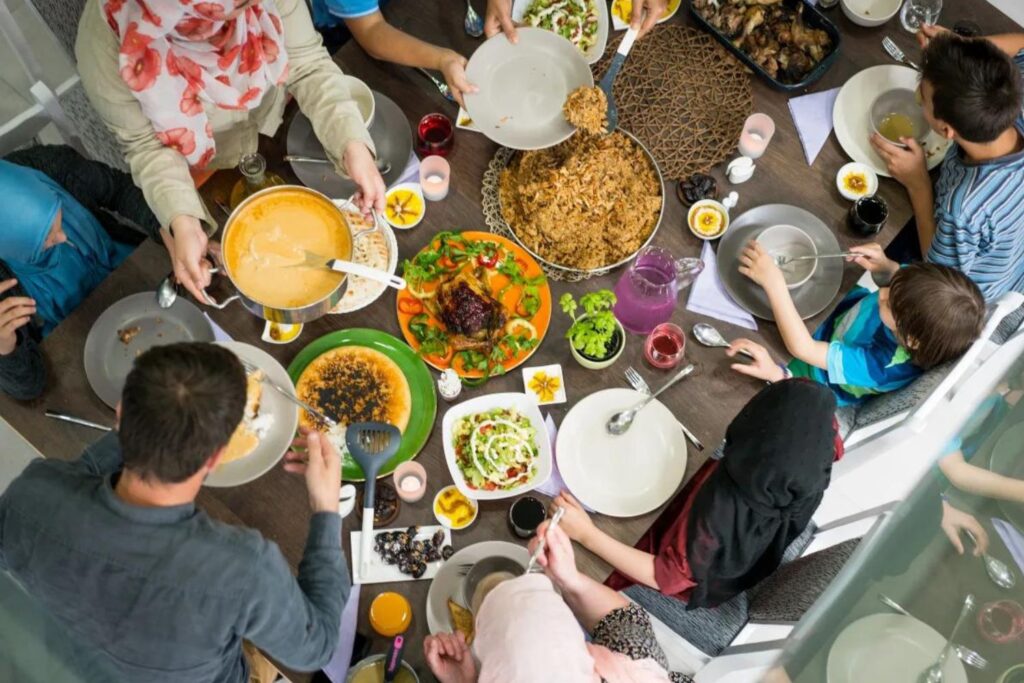In a world increasingly driven by rapid schedules and digital distractions. The sanctity of the family dinner table often fades into the background. Yet, this seemingly simple practice holds immense significance in nurturing strong family bonds, instilling values, and fostering emotional well-being. The dinner table is more than just a place to eat; it is a crucible of connection. A forum for dialogue, and a cornerstone of familial tradition. In this article, we delve into the multifaceted importance of family meals, exploring their historical roots, and cultural significance. And the profound impact they have on both individuals and family units.
The Tradition of Family Meals: A Historical Perspective
Family meals are not a modern invention; they are a time-honoured tradition with deep historical roots. From ancient civilizations to medieval feasts, sharing food has always been a symbol of unity and social cohesion. In many societies, the family meal was a daily ritual, a time to gather around the hearth, share stories, and reinforce social bonds. This tradition was not merely about sustenance but about reinforcing the social fabric that held families and communities together. In the past, the dinner table was often the only time of day when families could come together. Making it a sacred time for connection and communication.
Family Meals Across Cultures: A Global View
Across the globe, the practice of sharing meals varies widely, yet its importance remains universally acknowledged. Revolves around long, leisurely meals where conversation flows as freely as the wine. In Japan, the communal act of eating together, known as “shikoku,” is integral to the country’s health education system. In many Middle Eastern cultures, meals are a communal affair. Families and extended relatives gather around large platters of food, symbolizing abundance and hospitality. Each culture infuses its family meals with unique customs and rituals. Yet the underlying principle remains the same: the dinner table is a place of connection, tradition, and shared identity.
Why the Dinner Table Manners: An Overview

The dinner table is much more than a place to consume food; it is a microcosm of family life. It is where values are passed down, where children learn about their heritage, and where relationships are nurtured. The importance of the dinner table lies in its ability to bring people together in a shared experience, fostering a sense of belonging and continuity. In an era where families are often pulled in different directions, the dinner table serves as an anchor, a place where everyone can come together to reconnect and rejuvenate.
Strengthening Family Bonds Through Shared Meals
The act of sharing a meal has a unique power to strengthen family bonds. When families sit down together, they are not just sharing food; they are sharing their lives. The dinner table provides a space for open dialogue, where family members can discuss their day, share their thoughts, and offer support to one another. This regular interaction helps to build trust, understanding, and emotional intimacy, laying the foundation for strong, resilient family relationships. Moreover, the simple act of eating together can create lasting memories that bind family members together across generations.
The Psychological Benefits of Eating Together
The psychological benefits of family meals are profound. Studies have shown that children who regularly eat with their families are less likely to experience anxiety, depression, and behavioural problems. The dinner table offers a safe space where children can express their emotions, receive validation from their parents, and develop a sense of security. For adults, sharing meals with loved ones can reduce stress, increase feelings of happiness, and enhance overall well-being. The act of eating together promotes a sense of belonging and provides a natural opportunity for emotional support and connection.
Creating Rituals: How Family Dinners Foster Unity?

Rituals play a vital role in creating a sense of unity within families. And the dinner table is the perfect place to establish these traditions. Whether it’s a weekly pizza night, a special prayer before meals, or a simple practice of sharing what everyone is grateful for, these rituals provide structure and predictability in an often chaotic world. These small but meaningful traditions help to reinforce family identity. Create a sense of continuity, and offer a regular opportunity for family members to connect on a deeper level. Over time, these rituals become cherished memories that strengthen the bonds between family members.
Communication at the Dinner Table: The Lost Art of Conversation
In an age dominated by screens and social media, the art of face-to-face conversation is increasingly rare. The dinner table offers a unique opportunity to reclaim this lost art. It is a space where family members can engage in meaningful dialogue, listen to one another, and practice the essential skills of communication. Encouraging open-ended questions, active listening, and respectful debate at the dinner table can help to develop critical thinking skills and foster a culture of open communication within the family. These conversations are not only valuable for building relationships but also for helping children develop the social skills they need to succeed in the world.
Developing Social Skills: The Role of Family Meals
Family meals provide an ideal setting for children to develop essential social skills. At the dinner table, children learn how to take turns in conversation, listen actively, and respectfully express their thoughts and feelings. They also observe and model the behaviours of adults, learning important lessons about etiquette, empathy, and cooperation. These social skills are crucial for success in school, work, and personal relationships. By regularly engaging in family meals, children develop the confidence and competence they need to navigate social situations with ease.
Instilling Values and Traditions During Mealtime

The dinner table is a powerful platform for instilling values and traditions within the family. During meals, parents have the opportunity to discuss important topics such as honesty, kindness, and responsibility, helping to shape their children’s moral compass. Additionally, the dinner table is a place where cultural and religious traditions can be passed down from one generation to the next. Whether it’s a specific prayer, a holiday meal, or a unique family recipe, these traditions provide a sense of continuity and connection to the past, helping children develop a strong sense of identity and belonging.
The Impact of Family Dinners on Childhood Development
The impact of family dinners on childhood development cannot be overstated. Research has shown that children who regularly eat with their families are more likely to have better academic performance, stronger emotional health, and a lower risk of substance abuse. The dinner table provides a consistent and supportive environment where children can thrive. It offers a space for children to discuss their challenges, receive guidance from their parents, and develop a sense of security and stability. This regular interaction helps to build the foundation for healthy development and long-term success.
Academic Success and Dinner Table with Family: Is There a Connection?
There is a growing body of evidence suggesting a connection between regular family dinners and academic success. Children who participate in family meals are more likely to perform well in school, have better vocabulary skills, and demonstrate higher levels of motivation and self-discipline. The dinner table offers an opportunity for parents to engage with their children’s education, discuss school-related topics, and offer support and encouragement. Additionally, the structured environment of family meals can help children develop the habits of focus and perseverance that are essential for academic success.
Emotional Well-being: How Family Meals Alleviate Stress?

In today’s fast-paced world, stress is a common experience for both adults and children. Family meals provide a much-needed opportunity to slow down, relax, and reconnect with loved ones. The simple act of sitting down together and sharing a meal can help to alleviate stress and promote emotional well-being. For children, family meals offer a sense of stability and security, providing a safe space to express their feelings and receive support from their parents. For adults, family meals offer a break from the pressures of work and daily life, allowing them to unwind and enjoy quality time with their loved ones.
Building Healthy Eating Habits Together
The dinner table is an important setting for building healthy eating habits within the family. When families eat together, they are more likely to prepare and consume nutritious meals, reducing the risk of obesity and other diet-related health issues. Parents can model healthy eating behaviours, such as portion control, balanced meals, and mindful eating, which children are likely to adopt. Additionally, family meals provide an opportunity to introduce children to a variety of foods, helping to expand their palates and encourage a lifelong appreciation for healthy eating.
Modelling Healthy Behavior: Parents as Role Models
Parents play a crucial role in shaping their children’s behaviour. A dinner table is a key place where this modelling occurs. By demonstrating healthy eating habits, positive communication, and respectful behaviour, parents set an example for their children to follow. This modelling extends beyond just eating habits; it includes how parents handle stress, resolve conflicts, and express emotions. Children are keen observers, and the behaviours they witness at the dinner table can have a lasting impact on their attitudes and actions.
Encouraging Picky Eaters: Strategies That Work at the Dinner Table with Family

Dealing with picky eaters can be a challenge for many families. But the dinner table offers an opportunity to address this issue in a positive and supportive way. One effective strategy is to involve children in the meal planning and preparation process. Which can increase their interest in trying new foods. Another approach is to introduce new foods gradually, alongside familiar favourites, to reduce resistance. Patience is key; it may take several exposures to a new food before a child is willing to try it. Creating a relaxed and pressure-free environment at the dinner table can also help to reduce anxiety around eating and encourage more adventurous eating habits.
The Role of the Dinner Table in Managing Family Conflict
The dinner table is not only a place for nourishment but also a forum for resolving conflicts and addressing family issues. When approached with care, the dinner table can be a space where family members can express their concerns. Discuss differences, and work towards solutions constructively. Establishing ground rules for respectful communication and encouraging active listening can help to create a positive atmosphere where conflicts can be addressed without escalating. By regularly sitting down together, families can maintain open lines of communication. Making it easier to address issues as they arise and prevent misunderstandings from festering.
Balancing Busy Schedules: Making Time for Dinner Table with Family
In today’s busy world, finding time for regular family meals can be a challenge, but it is a worthwhile endeavour. Prioritizing family dinners requires intentionality and planning. This might mean adjusting work schedules and simplifying meal preparation. Or even setting aside certain nights of the week as “family dinner nights.” The key is to make family meals a non-negotiable part of the routine. Recognizing that the benefits far outweigh the effort involved. Even if it’s not possible to have dinner together every night, making the effort to gather for meals as often as possible can have a significant positive impact on family dynamics.
The Role of Technology: Should Gadgets Be Banned at the Table?
In an age where screens dominate our lives, the dinner table should be a sanctuary from technology. Banning gadgets at the dinner table can help to create an environment where family members can focus on each other without the distractions of phones, tablets, or televisions. This “unplugged” time encourages more meaningful interactions, allowing for deeper conversations and greater connection. Setting clear boundaries around technology use during meals can help to reinforce the importance of being present and engaged with one another.
Creating a Pleasant Atmosphere: Tips for a Dinner Table with Family

A pleasant atmosphere is key to making family dinners enjoyable and stress-free. Simple steps such as setting a welcoming table, and playing soft background music. Encouraging positive conversation topics can transform the dinner experience. It’s also important to be mindful of the emotional tone at the table; addressing conflicts or heavy topics during a meal can detract from the enjoyment of the experience. Instead, focus on creating a relaxed and cheerful environment where everyone can unwind and enjoy each other’s company. Keeping the atmosphere light and positive can make family dinners something everyone looks forward to.
The Importance of Meal Planning and Preparation
Effective meal planning and preparation are essential for ensuring that family dinners are both nutritious and enjoyable. Planning meals can help to reduce stress, save time, and ensure that the family is eating a balanced diet. Involving family members in the meal-planning process can also be fun. And engaging ways to ensure that everyone’s preferences are taken into account. Preparation is key; having ingredients ready and knowing what to cook ahead of time can make the cooking process smoother and more enjoyable. This also allows for more quality time to be spent at the table, rather than in the kitchen.
Involving Children in Cooking: A Pathway to Togetherness
Involving children in the cooking process is a great way to teach them valuable life skills and foster a sense of togetherness. Cooking together can be a fun and educational experience, where children learn about nutrition, following instructions, and the joy of creating something with their hands. It also provides an opportunity for parents and children to bond, as they work together to prepare a meal. This shared activity can make children more interested in the food they eat and more likely to try new things. Additionally, involving children in cooking can give them a sense of ownership and pride in the meal, making family dinners even more special.
Special Occasions: Making Family Dinners Extra Meaningful
While regular family dinners are important, special occasions offer an opportunity to make these gatherings even more meaningful. Whether it’s a birthday, holiday, or simply a celebration of a personal achievement. Marking these events with a special meal can create lasting memories. These occasions can be made extra special by incorporating unique traditions. Such as preparing a favourite dish, decorating the table, or sharing a toast. These moments of celebration help to reinforce the bonds between family members and create a sense of shared joy and accomplishment.
The Dinner Table as a Space for Gratitude and Reflection

The dinner table is an ideal setting for practising gratitude and reflection. Taking a moment to express thanks for the food, the company, and the day’s blessings can help to cultivate a positive and appreciative mindset. This practice can be as simple as going around the table. And having each person share something they are grateful for. Reflection can also be incorporated into the meal. With family members discussing their highs and lows of the day, lessons learned, or goals for the future. These practices not only enhance the mealtime experience but also contribute to a more mindful and connected family life.
Overcoming Challenges: When Family Meals Aren’t Possible
There are times when regular family dinners may not be possible due to busy schedules, conflicting commitments, or other challenges. In these situations, it’s important to find alternative ways to maintain family connections. This might mean having breakfast together, scheduling regular family check-ins, or setting aside time on weekends for shared activities. The key is to prioritize family time in whatever form it takes. Recognizing that the benefits of connection and communication are invaluable. Flexibility and creativity are essential in overcoming the obstacles to regular family meals.
Long-term Benefits of Regular Dinner Table with Family
The long-term benefits of regular family dinners extend far beyond the immediate enjoyment of a shared meal. Over time, these gatherings contribute to stronger family bonds and healthier eating habits. Better academic and social outcomes for children, and greater emotional well-being for all family members. The dinner table becomes a foundation for lifelong relationships. A place where family members can always return for support, connection, and comfort. These benefits are not just for the present; they lay the groundwork for a healthier, happier, and more connected family life in the future.
YouTube Video
Conclusion
In conclusion, the family dinner table is a powerful tool for fostering connection, communication, and well-being within the family. Despite the challenges of modern life, making time for regular family meals is an investment in the health and happiness of the family unit. The dinner table is a place where traditions are kept alive, values are instilled, and relationships are strengthened. Its enduring value lies in its ability to bring people together, creating a sense of belonging, continuity, and shared purpose. In a world that is constantly changing, the family dinner table remains a timeless and essential part of family life.


